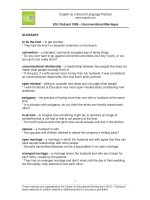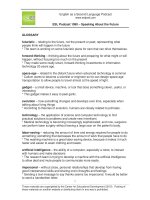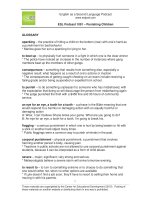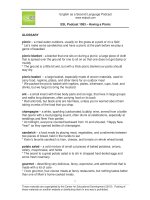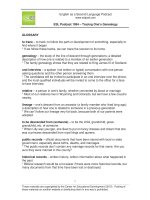ESLPod 1126 guide Want to be Fluent in English?
Bạn đang xem bản rút gọn của tài liệu. Xem và tải ngay bản đầy đủ của tài liệu tại đây (96.75 KB, 10 trang )
English as a Second Language Podcast
www.eslpod.com
ESL Podcast 1126 – Using a Pawnshop
GLOSSARY
to raise – to earn or collect money for some purpose or cause, especially for a
nonprofit organization
* How can we raise money to help the victims of the earthquake?
to hock – to leave something at a pawn shop in exchange for money; to sell
something at a pawnshop;
* Wendy had to hawk Grandma’s jewelry to pay her rent last month.
pawnshop – a business where people receive a small amount of money for
valuable items, and if they can repay the money, they receive the items back, but
if they cannot repay the money, the business keeps the items to sell them
* Aren’t pawnshops supposed to tell the police if they receive expensive items
that they think might have been stolen?
short-term loan – money that is given to someone for a short period of time with
the expectation that it will be repaid quickly, usually at a very high rate of interest
* We need a short-term loan of $300 for just two weeks, until we get paid again.
to tide (someone) over – to help someone through difficult circumstances by
giving that person enough of what he or she needs during that time
* I’m starving! Do you have an apple or something that will tide me over until
dinner?
legit – legitimate; real and justified; not fake or a scam
* Are these immigration paper legit or are they forged?
complaint – a statement that one is dissatisfied, disappointed, or unhappy with
something and wants others to know it
* Please call the manager if you have any complaints or concerns about our
customer service.
pawnbroker – a person who owns or works in a pawnshop
* The pawnbroker is very good at estimating the value of jewelry, art, and
electronics.
collateral – something that one gives or provides to secure a loan, so that if one
does not repay a loan as planned, the lender gets to keep the item
* Wow, your parents must really believe in your business if they put up their
house as collateral for your business loan.
1
These materials are copyrighted by the Center for Educational Development (2015). Posting of
these materials on another website or distributing them in any way is prohibited.
English as a Second Language Podcast
www.eslpod.com
ESL Podcast 1126 – Using a Pawnshop
fraction – a small portion or part of something, not the entire amount
* In retirement, they had to learn to live on a fraction of their former income.
value – the amount of money that something is worth; how much something
could be sold for
* This week only, if you buy one pastry, you’ll get a second pastry of equal or
lesser value for free.
to repay – to pay something back; to return the full amount of what one has
received
* It took 20 years, but we’ve finally repaid our student loans!
to redeem – to get something back that originally belonged to oneself, but has
more recently been in another person’s possession or has been held by another
person
* Hold onto this ticket. You’ll need it to redeem your coat and backpack when
you’re ready to leave the museum.
pawn ticket – a small piece of paper that one receives when leaving an item at a
pawnshop, identifying what the item is, who it came from, and when it must be
picked up
* If we lose the pawn ticket, is it still possible to get the item back?
to forfeit – to give up ownership of something or to lose something, especially as
a punishment for failure to do something
* If you don’t pick up your deposit within two years, you will forfeit it.
to recoup – to recover; to make up for something that was lost
* Everyone is working overtime to try to recoup the time lost on that project.
collection – a set of objects that one has gathered and stored, usually due to
personal interest or value
* Have you seen Jane’s collection of stamps?
action figure – a small toy in the shape of a person, with moving arms, legs, or
other parts, especially made to look like a living person
* The little boys make their action figures fight each other again and again.
2
These materials are copyrighted by the Center for Educational Development (2015). Posting of
these materials on another website or distributing them in any way is prohibited.
English as a Second Language Podcast
www.eslpod.com
ESL Podcast 1126 – Using a Pawnshop
COMPREHENSION QUESTIONS
1.
a)
b)
c)
Why is Nolan going to pawn some items?
Because maintaining them is too expensive.
Because he wants them to go to a better home.
Because he needs some money.
2.
a)
b)
c)
What does Jamaica mean when she asks, “Is the place legit?”
She wants to know if the pawnshop is clean.
She wants to know if the pawnshop can be trusted.
She wants to know if the pawnshop opened recently.
______________
WHAT ELSE DOES IT MEAN?
to tide (one) over
The phrase “to tide (one) over,” in this podcast, means to help someone through
difficult circumstances by giving that person enough of what he or she needs
during that time: “Can you give me some of your printer paper, just to tide me
over until I can get to the office supply store later today?” The “tide” is the rising
and falling of sea water each day due to the pull of the moon and sun: “All right
kids, the tide is coming in and you’ll need to move farther up the beach to play if
you don’t want to get wet.” The phrase “to turn the tide” means to change the
direction that something is moving or action is being taken: “Susan’s illness
turned the tide on the third day and she began to get better.”
value
In this podcast, the word “value” means the amount of money that something is
worth, or how much something could be sold for: “How do banks estimate the
value of the homes they’re providing loans for?” The phrase “face value” refers to
the printed amount on a coin, stamp, or bill, especially if it is less than the
object’s actual value: “This coin is 200 years old, and although its face value is
five cents, it’s actual value is several hundred dollars.” Sometimes the word
“value” describes the benefit or satisfaction that one receives for it in relation to
what was paid for it: “This brand is expensive, but it offers really good value.”
Finally, the word “value” can refer to one’s belief about what is important or good:
“Honesty, friendship, and simplicity are important values in Sheila’s life.”
3
These materials are copyrighted by the Center for Educational Development (2015). Posting of
these materials on another website or distributing them in any way is prohibited.
English as a Second Language Podcast
www.eslpod.com
ESL Podcast 1126 – Using a Pawnshop
CULTURE NOTE
Typical Items in a Pawnshop
The “items” (objects) typically pawned are “generally” (usually) representative of
the neighborhood where the pawnshop is located. In an “upscale” (with many rich
people) neighborhood, pawnshops have many expensive items, but in “inner-city”
(related to the poor areas of downtown in a large city) areas, the pawnshops offer
less expensive items.
Most pawnshops carry gold and silver jewelry with “gemstones” (expensive
rocks, such ased diamonds, rubies, and emeralds). Sometimes they value the
items only at the value of the metal, but at other times they can sell the jewelry
for higher prices. Many pawnshops also carry “household items” (things used in
the home), especially “glassware” (fancy glass dishes and cups). “Tools” (objects
used to perform work), and especially “power tools” (tools that use electricity) are
common, and it is not unusual to see “pricy” (expensive) “leaf blowers” (machines
that blow air to move leaves) and “carpentry” (woodworking; making things from
wood) tools.
Electronics are becoming increasingly common at pawnshops. Some pawnshops
carry computers, but cell phones, digital cameras, “GPS” (navigational) devices,
and video game “consoles” (machines that allow people to play video games) are
more common. Most pawnshops also carry musical instruments, video games,
DVDs, and even CDs. In general, the pawnshops carefully check the quality and
condition of items before they agree to accept them.
Few pawnshops carry clothing, although sometimes they will give money for
wedding dresses, leather jackets, and “designer” (made by a design professional
and sold at a high price) “accessories,” such as boots, handbags, and belts.
______________
Comprehension Questions Correct Answers: 1 – b; 2 – c
4
These materials are copyrighted by the Center for Educational Development (2015). Posting of
these materials on another website or distributing them in any way is prohibited.
English as a Second Language Podcast
www.eslpod.com
ESL Podcast 1126 – Using a Pawnshop
COMPLETE TRANSCRIPT
Welcome to English as a Second Language Podcast number 1,126 – Using a
Pawnshop.
This is English as a Second Language podcast episode 1,126. I’m your host, Dr.
Jeff McQuillan, coming to you from the Center for Educational Development in
beautiful Los Angeles, California. (I don’t know. Not enough coffee this morning.
Sorry.)
Visit our website at ESLPod.com. You can become a member of ESL Podcast
when you do that. This episode is a dialogue about using a pawnshop – a store
where you can bring your old items and get money for them. Let’s get started.
[start of dialogue]
Jamaica: I need to raise some cash right away. I’m thinking of hocking a few
things. You’ve used the pawnshop down the street before, right?
Nolan: Yeah, a few years ago when I lost my job. I needed a short-term loan to
tide me over until I could find a new one.
Jamaica: Is the place legit?
Nolan: It seemed to be. I have no complaints.
Jamaica: That’s good. How would I go about pawning something?
Nolan: It’s pretty simple. You bring the pawnbroker something that’s worth money
to use as collateral and then you get a loan for a fraction of its value. Then, you
have 90 days to repay the loan, plus interest and fees.
Jamaica: How do I redeem my item?
Nolan: You just show them your pawn ticket.
Jamaica: That sounds pretty simple. What if I can’t repay the money by the
deadline?
Nolan: Then you forfeit your item. The pawnshop tries to sell it to recoup the
money they lent you.
5
These materials are copyrighted by the Center for Educational Development (2015). Posting of
these materials on another website or distributing them in any way is prohibited.
English as a Second Language Podcast
www.eslpod.com
ESL Podcast 1126 – Using a Pawnshop
Jamaica: Okay, I’m going to do it. I’m going to pawn my collection.
Nolan: Your collection of what?
Jamaica: Action figures. I have the entire collection of ESL Podcast action
figures. There’s Jeff, Lucy, Warren, Jessica, Adriano, Pao, LeeAnn, Alison . . .
Nolan: I said something worth money, remember?
[end of dialogue]
Jamaica says to Nolan, “I need to raise some cash right away.” “To raise (raise)
cash,” or “to raise money,” means to get money for some specific purpose.
Certain organizations, for example, try to raise money to support the goals and
activities of the organization. If a person, an individual, says that she wants to
raise cash or needs “to raise some cash right away,” as Jamaica says, usually
she means that she needs money for some specific reason.
Jamaica says, “I’m thinking of hocking a few things.” The verb “to hock” (hock)
means to leave something usually at a place called a “pawn (pawn) shop” in
exchange for money. Basically what you are doing is giving the pawnshop, say, a
ring or a computer or something valuable in exchange for money that the
pawnshop gives to you. Now, usually a pawnshop will keep what you give them
for a certain number of days or weeks, and if you don’t come back and buy it
back – give them money to get your item back – well, the pawnshop will then sell
it to someone else.
Pawnshops are popular still in the United States in some neighborhoods,
especially poorer neighborhoods where people often need to get money and so
they try to sell – or we would even use the verb “pawn” – their items. The verb “to
pawn” means the same is the verb “to hock.” Jamaica says, “You’ve used the
pawnshop down the street before, right?” Nolan says, “Yeah, a few years ago
when I lost my job.” People don’t usually use a pawnshop unless they really need
money badly. They don’t want to get rid of their valuable things, but they don’t
have a choice sometimes.
Nolan says, “I needed a short-term loan to tide me over until I could find a new
one” – that is, a new job. Many people use pawnshops basically as a way of
getting a loan for something they need money for right now. Then they try to get
money together to buy whatever it is that they gave to the pawnshop back. Nolan
says he needed a “short-term loan,” meaning money that you give someone for
6
These materials are copyrighted by the Center for Educational Development (2015). Posting of
these materials on another website or distributing them in any way is prohibited.
English as a Second Language Podcast
www.eslpod.com
ESL Podcast 1126 – Using a Pawnshop
only a short period of time. It might be a month. It might be two months. It might
be a year.
“To tide someone over” means to help someone through a difficult situation. If
someone says, “I need $100 to tide me over until tomorrow,” the person is telling
you that he needs $100 in order to pay his bills and expenses until tomorrow. If
you’re lucky, you’ll get your money back tomorrow.
Nolan says he needed a short-term loan to tide him over until he could find a new
job. Jamaica says, “Is the place legit?” The word “legit” (legit) is short for an
informal way of saying “legitimate” (legitimate).”Legitimate” means real,
something that is not fake, something that is what it says it is.
Nolan says, “It seemed to be. I have no complaints.” A “complaint” (complaint) is
a statement that you are dissatisfied, disappointed, or unhappy with something. If
someone says, “I have no complaints,” the person means that he was happy
(with, in this case, the pawnshop). Jamaica says, “That’s good. How would I go
about pawning something?” “To go about” means to do. “How would I pawn
something?” is what Jamaica is asking here.
Nolan says, “It’s pretty simple,” meaning it’s very simple. “You bring the
pawnbroker something that’s worth money to use as collateral, and then you get
a loan for a fraction of its value.” A “pawnbroker” (pawnbroker) is a person who
owns a pawnshop. Nolan says, “You give the pawnbroker something that’s worth
money” – something that has value, maybe an old ring or a phone or a computer.
That thing, that item, is used as collateral. “Collateral” (collateral) is something
that you give someone in order to get a loan. It’s something that we would say
“secures” the loan.
For example, if you want to buy a car, and you want to get a loan for the car, a
bank may ask you for collateral. They may ask you, in other words, for something
that’s worth money, so in case you don’t pay the loan back, they can get their
money back. Now, the car itself may serve as collateral. For example, when you
buy a house, when you get a loan to buy the house, the house itself is your
collateral. If you don’t pay the loan back, the bank will take your house. So,
collateral is something worth something that allows you to get a loan.
In a pawnshop, whatever you bring to the pawnbroker is your collateral, and the
pawnbroker will then give you money as a loan. But the pawnbroker won’t give
you 100 percent of what the item is worth. The pawnbroker will only give you “a
fraction of its value.” A “fraction” (fraction) is a term from mathematics that refers
to a part of something, a portion of something. One-half, one-third, one7
These materials are copyrighted by the Center for Educational Development (2015). Posting of
these materials on another website or distributing them in any way is prohibited.
English as a Second Language Podcast
www.eslpod.com
ESL Podcast 1126 – Using a Pawnshop
hundredth – those are all “fractions,” percentages of the whole amount. “Value”
(value) is what something is worth, how much money it is worth.
Nolan says, “Then, you have 90 days to repay the loan, plus interest and fees.”
“To repay (repay) a loan” means to give the person who gave you the loan the
money back. You’re giving him the money that he gave you. Now, when you go
to a pawnbroker, you have to give the money that the pawn broker gave you plus
“interest,” which is basically the price of the loan. It may be 1 percent, it maybe
10 percent.
Jamaica says, “How do I redeem my item?” “To redeem” (redeem) in this case
means to get something back that you originally owned. At a pawnshop, it means
to get back what you gave the pawnbroker in order to get the loan. Nolan says,
“You just show them your pawn ticket.” When you give something to a
pawnbroker, the pawnbroker will give you a little piece of paper called a “ticket”
that usually has a number on it, and you bring that back and the pawnbroker can
find your item in order to give it back to you – after, of course, you’ve paid the
pawnbroker the money that he lent you.
Jamaica says, “That sounds pretty simple. What if I can’t repay the money by the
deadline?” That is, what if 90 days goes by and you don’t have money to get your
item back? Nolan says, “Then you forfeit your item.” “To forfeit” (forfeit) means to
lose something, especially as a punishment for failing to do something. In this
case, it means you no longer own the item that you gave to the pawnbroker. You
can no longer get it back, at least not by just paying the loan amount.
Nolan says, “The pawnshop tries to sell it to recoup the money they lent you.” So,
if you give the pawnshop your wedding ring in order to get a short-term loan, and
you are not able to pay the loan back, the pawnshop will sell your wedding ring to
someone else. Maybe your wife will buy it. Who knows?
Nolan says the pawnshop sells things “to recoup” their money. “To recoup”
(recoup) means to recover something, to get something back that was lost. In
this case, the pawnshop needs to get back the money that they lent you that you
did not pay them back. Jamaica says, “Okay, I’m going to do it. I’m going to pawn
my collection.” A “collection” is a set of objects that are related to each other.
Some people like to collect coins. Some people like to collect dolls. Some people
like to collect old magazines.
What does Jamaica collect? Action figures. “Action figures” are little toys that are
in the shape of a person or some character. Often, in movies for children, the
movie studio – the company that makes the movie – will sell little toys, little action
8
These materials are copyrighted by the Center for Educational Development (2015). Posting of
these materials on another website or distributing them in any way is prohibited.
English as a Second Language Podcast
www.eslpod.com
ESL Podcast 1126 – Using a Pawnshop
figures, and you can move the little arms and the little legs, and of course your
children are going to want to buy them because they saw the movie.
Jamaica collects action figures of ESL Podcast characters. She says, “There’s
Jeff, Lucy, Warren, Jessica, Adriano, Pao, LeeAnn, Alison . . .” In other words,
Jamaica has, apparently, action figures of those of us who work on ESL Podcast.
I didn’t even know these existed, but I guess they do, because it’s in the
dialogue. Jamaica wants to sell these things – or pawn these things, rather – to
the pawnshop.
But Nolan interrupts her and says, “I said something worth money, remember?”
Nolan is I think making a joke here. He’s saying that action figures from ESL
Podcast would not be worth any money, and the pawnbroker wouldn’t give you
any money if you tried to hock or pawn them at his pawnshop. Well, I think they’d
be worth a lot of money. Don’t you?
Now let’s listen to the dialogue, this time at a native rate of speech.
[start of dialogue]
Jamaica: I need to raise some cash right away. I’m thinking of hocking a few
things. You’ve used the pawnshop down the street before, right?
Nolan: Yeah, a few years ago when I lost my job. I needed a short-term loan to
tide me over until I could find a new one.
Jamaica: Is the place legit?
Nolan: It seemed to be. I have no complaints.
Jamaica: That’s good. How would I go about pawning something?
Nolan: It’s pretty simple. You bring the pawnbroker something that’s worth money
to use as collateral and then you get a loan for a fraction of its value. Then, you
have 90 days to repay the loan, plus interest and fees.
Jamaica: How do I redeem my item?
Nolan: You just show them your pawn ticket.
Jamaica: That sounds pretty simple. What if I can’t repay the money by the
deadline?
9
These materials are copyrighted by the Center for Educational Development (2015). Posting of
these materials on another website or distributing them in any way is prohibited.
English as a Second Language Podcast
www.eslpod.com
ESL Podcast 1126 – Using a Pawnshop
Nolan: Then you forfeit your item. The pawnshop tries to sell it to recoup the
money they lent you.
Jamaica: Okay, I’m going to do it. I’m going to pawn my collection.
Nolan: Your collection of what?
Jamaica: Action figures. I have the entire collection of ESL Podcast action
figures. There’s Jeff, Lucy, Warren, Jessica, Adriano, Pao, LeeAnn, Alison . . .
Nolan: I said something worth money, remember?
[end of dialogue]
It’s impossible to repay our scriptwriter for her wonderful work, but we can say
thank you to Dr. Lucy Tse.
From Los Angeles, California, I’m Jeff McQuillan. Thank you for listening. Come
back and listen to us again right here on ESL Podcast.
English as a Second Language Podcast was written and produced by Dr. Lucy
Tse, hosted by Dr. Jeff McQuillan. Copyright 2015 by the Center for Educational
Development.
10
These materials are copyrighted by the Center for Educational Development (2015). Posting of
these materials on another website or distributing them in any way is prohibited.
